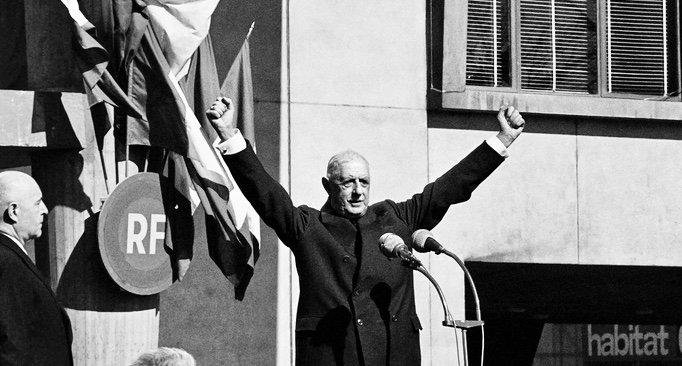

In speaking of my very personal journey into the Heart of Catholic France, we have invoked Valentin Tomberg’s observations regarding the 1960’s mentality.
And we spoke before about the French President Charles de Gaulle approaching the army to quell the riots, rather than caving in, during the late spring of 1968.
And now thanks to a beloved friend and brother of my heart, who also happens to be a native German speaker, we can offer here a translation from Tomberg’s late 1960’s correspondence.
It should be said that Tomberg was addressing his own beloved friend and brother of the heart, the German Ernst von Hippel, who had been a Professor of Jurisprudence at a German university. More than twenty years before, von Hippel had supervised Tomberg’s profound Catholic works on Law.
Now, the student riots that had broken out in Paris – before they were quelled by De Gaulle – had also spread to Germany.
And many professors were deeply shaken by the events. And before we turn to Tomberg’s correspondence to his professor friend, let us also note that another German professor was deeply affected by the same events.
His name was Joseph Ratzinger.
And people have argued that Ratzinger’s transformation from a liberal to a conservative, began with his sheer horror at the student agitation in that feverish summer – drunk with anger as Tomberg would say.
(Indeed on television, I once saw Hans Küng subtly mock Ratzinger for being a coward, implying that the more diminutive Ratzinger could not defend his professorial microphone against the student onslaught. If I recall correctly – and I believe I do – Küng was claiming that by contrast, he could defend his microphone, given his larger physical stature than Ratzinger. Yes, Küng appeared to say nothing less than that the more diminutive Ratzinger suffered a loss of courage after 1968 – and this led to his break with Liberal Catholicism.)
The truth, I suspect, is that Joseph Ratzinger’s heart was ripped open by the student agitation and he was transformed as a result, whereas Küng’s heart was not ripped open and he was not transformed …)
But now let us turn to what Tomberg himself thought of the 1960’s revolution. He writes to Ernst von Hippel:
Just like the bishops as guardians of the truth have to stand at their post without compromise, the responsible professors as well have to stand for the truth – and not to follow the politicising and similar claims – let alone to support them.
Please, do not be intimidated and discouraged, if even your closest ones are considering this attitude as naive and obsolete.
Because it is the right one.
General de Gaulle’s astonishing victory which has saved France (and perhaps Europe) from chaos, is an example of the magic of “standing at one’s post”(German: Stylirenrom).
Would he have wanted to keep his popularity through compliancy and ‘flexibility’ all would have been lost.
The Encyclical Humanae Vitae of the Pope is a similar turning point. Would the Pope have yielded to the so-called ‘Zeitgeist’ then the intellectual and moral masses (German: ‘Strasse’ – see note below*) within the Catholic Church would have taken over in just the same way as the Parisian mob in France, if de Gaulle would have wavered.
Thanks be to de Gaulle, thanks be to the Holy Father!
These two have once more brought the Father Principle to effect against the onslaught of the drunken youth and the drunken reformers.’
Around the same time, Tomberg wrote further correspondence to, which further illumines his attitudes to much that was happening in the 1960’s:
Peace is in great danger. The nature of this danger is not so much rampant China, the embittered Arabs, the plans of Russia … the aimless war of Vietnam – no … Is not the whirlwind which was caused by [de Gaulle’s pro-Quebec declarations] an unmistakeable sign that the inclination to see and judge clearly is vanishing … A drunken anger has suddenly spread everywhere.
An atmosphere of drunkenness exists … And this is the danger. This atmosphere is what makes Maria [Tomberg’s wife] and myself ill. We are not well health-wise – like with poisoned people.
Private letter, quoted in Heckmann and Frensch, Valentin Tomberg: Leben, Werk, Wirkung, p. 468-69.
To be Continued … (Though I imagine not immediately. Other weblog entries will likely come first.)
*Note on translation of ‘Strasse’ above: My German friend explains that Tomberg uses ‘Strasse’ – street in German – as a colloquialism for which no English translation is adequate. ‘Masses’ is perhaps the closest approximation. One may think of the English expression ‘man in the street’.
And it would seem that Tomberg is saying that the Catholic ‘men in the street’ would have hijacked the Church, if Pope Paul VI had not ‘brought the Father Principle to effect against the onslaught of the … drunken reformers.’ (It is worthwhile studying the sentence above closely: ‘drunken youth’ seems to refer to the Parisian mobs; ‘drunken reformers’ to the opponents of the encyclical on artificial birth control.)
To Navigate through these Odd Entries:


Foreword for Monarchy by Roger Buck
Buying Books at Amazon Through These Links Gives Us a Commission. This Supports Our Apostolate. Thank You if You Can Help Us Like This!





Comments
comments are currently closed
One response to “Valentin Tomberg, Catholic France and the Sacred Heart —Pt. 4”
[…] As we recently featured in an entry here, Tomberg wrote deep praise in favour of Pope Paul VI and Charles De Gaulle’s response to that 1960′s revolution, where in fact De Gaulle called out the military: […]